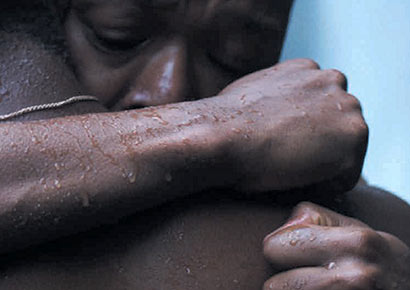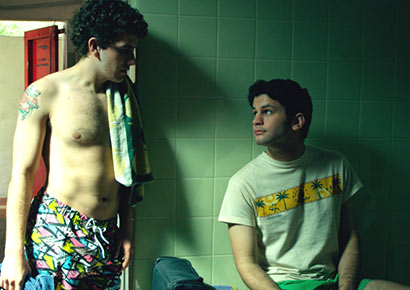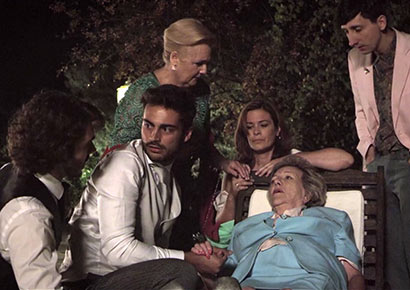7th Durban Gay & Lesbian Film Festival to screen The Wound (Inxeba)

Inxeba (The Wound)
Now in its 7th year, the Durban Gay & Lesbian Film Festival (DGLFF), is expanding its reach within the Ethekwini region with screening venues that will include Durban’s Outer West LGBTIQ communities.
From both a practical and demand-driven perspective, this annual cinematic celebration of independent queer cinema, has recognised that for many, the journey to “town” is both expensive and often far.
Therefore, Festival Director Jason Fiddler has successfully negotiated with Tina’s Hotel in Kloof, home to Roland Stansell’s branch of Rhumbelow Theatre, to host two evening screenings of films on Thursday 31 August and Friday 1 September.
The festival runs from 25 August to 3 September 2017 and includes the Aha Waterfront Hotel & Spa in Point, Alliance Francaise and the Durban Lesbian & Gay Centre in Morningside, and the KZNSA Gallery in Glenwood as screening venues over its 10 day run.
Included in the two-night Tina’s Hotel line up are the Argentinean drama Bromance (three friends realise they’ve grown as young men and their relationship is devolving on a weekend getaway), the powerful South African feature drama Inxeba (The Wound); a multi-award winning story about a gay relationship pitted against the traditional Xhosa coming-of-age ceremony), Boys for Sale (an adults-only feature documentary that takes a candid journey with mainly straight gay-for-pay escorts in Japan’s oldest red light district) and Something Like Summer (a surprisingly complex comedy-musical-romance that follows two high school guys whose whirlwind romance goes awry).

Bromance
Fiddler couldn’t be prouder or happier about securing Inxeba for the 7th DGLFF.
“I’ve known about The Wound (Inxeba) as a project since the 2014 Durban Film Mart, when producer Elias Ribeiro was pitching it as a project for financing,” explains Fiddler. “I told him there and then I wanted it for DGLFF one day [and that] our audiences deserved to see a great locally made film that spoke to their own experiences, that shared their own stories.”
Growing social media attention around the film has led to calls for protest. Some in the Xhosa community and elsewhere have deemed the film a serious issue, bordering on cultural exploitation. Amidst sporadic calls for a boycott, and some reports of threats to cast members, Fiddler is pragmatic.
“Whilst I’m deeply concerned that the intolerance and aggression displayed by some is very real, I also expect that many detractors haven’t actually seen this powerful piece of cinema,” said Fiddler. “We must have the space to express our creativity, artistry and views frankly and without intimidation. Instead of acknowledging the existence of very real gay relations in all our societies, that men who have sex with men do exist, focus is immediately shifted as if this is attacking one group, and it falsely presumes a challenge to African cultural beliefs. I sincerely don’t believe this to be the case.”
Further, Fiddler has curated two sets of short films for outer west audiences. Running at 67 minutes, Lesbian Shorts includes three beautiful short films (Lily, from Ireland; The Masterful Hermit, from Wales; and The Pretty Things are Going to Hell, from Denmark), that explore tender relationships, old flames that turn up unexpectedly and the pain of parting.

The Marriage
Spanish Gay Shorts (running 54 minutes) includes a trio of Spanish-language short films that explore the bisexual feelings of a man between his girlfriend and his best friend (Goldfish, from Mexico); the very real matter of a long time couple who need to frankly discuss their sex life (Versatile, from Spain); and how little white lies can make for hilarious complications with grandma on your wedding day (The Marriage, from Spain).
With 7 feature films, 11 documentaries and almost 30 short films from 14 countries, including South Africa, the DGLFF expects to speak to the interests of many different audiences.
Fiddler also encourages mainstream audiences who love good cinema to participate: “Ours is an inclusive festival. You don’t have to be gay, or lesbian, or otherwise to appreciate these well made films. You just need to be open minded, and make the effort to discover new stories.”
The 2017 Durban Gay & Lesbian Film Festival runs from 25 August to 3 September. For more information and the full programme, visit the website.
Leave a Reply